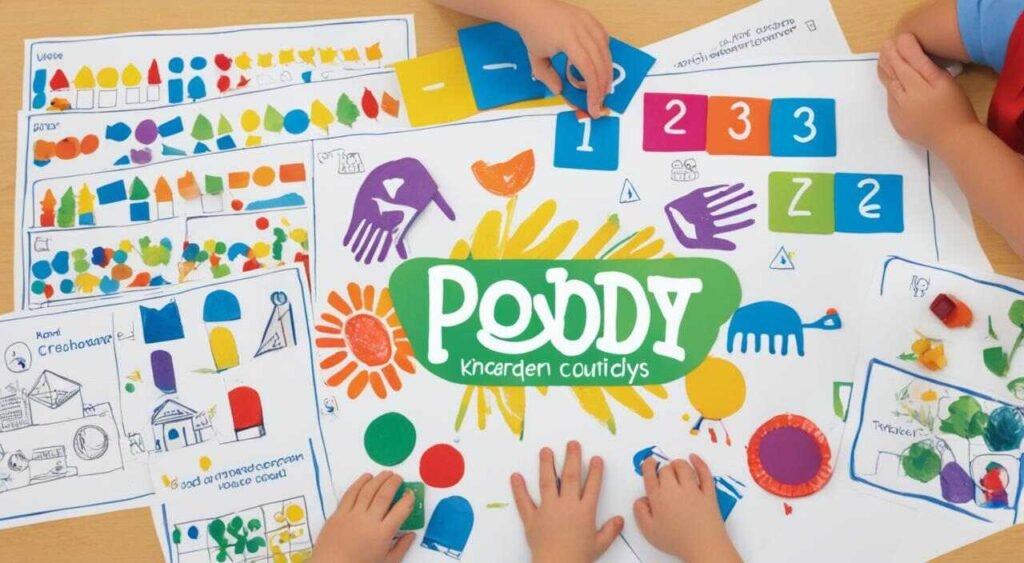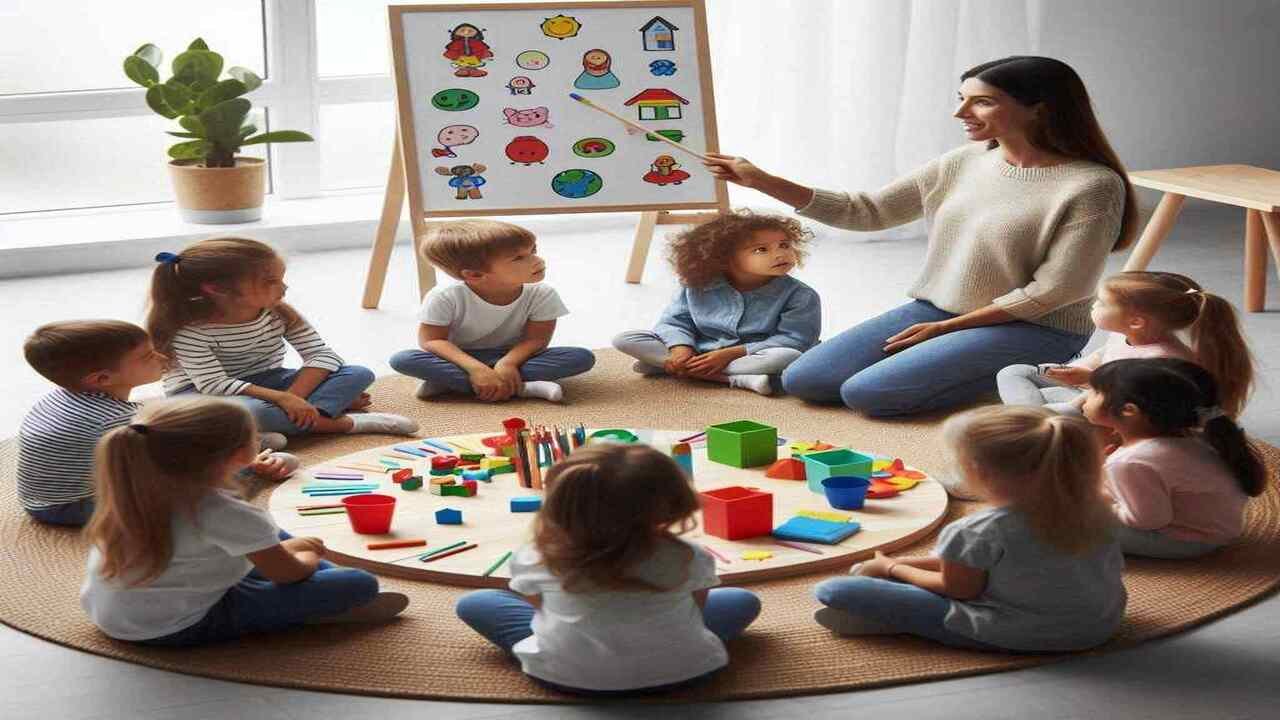Kindergarten starts a big journey for kids in learning. They learn about letters, numbers, colors, and shapes. But it’s not just academics. They also learn how to make friends and follow classroom rules. This helps them be ready for later school years. The teaching is based on the Common Core rules. This guides what kids should learn in reading, math, science, and more.
Teachers make learning fun with hands-on activities and lessons that get kids involved. This includes exploring and figuring things out on their own.
Key Takeaways
- Kindergarten focuses on developing core academic and social-emotional skills
- The curriculum follows the Common Core standards for a well-rounded education
- Hands-on activities and interactive learning are emphasized to engage young students
- Classroom routines and social skills are prioritized to support school readiness
- Alphabet introduction, number recognition, and other foundational concepts are taught
Common Core Skills in Kindergarten
Kindergarten is where kids start their journey into reading and writing. They learn all 26 letters and their sounds. They also tackle short, easy words and stories.
This is when they practice writing their letters, words, and names. They also work on talking better. This helps them share their thoughts and experiences.
The Alphabet and Letter Sounds
Learning letters and their sounds is a key goal in kindergarten. Kids get to know both capital and lowercase letters. They match each letter to its sound.
This way of teaching, called phonics, sets them up for reading and writing success.
Reading Short Words and Storybooks
In kindergarten, students dive into reading. They learn simple, frequently used words and can read some by themselves. They also get to enjoy simple books.
Reading these books boosts both their confidence and their love for reading.
Writing Letters, Words, and Names
Writing is big in kindergarten too. Kids learn how to print the alphabet. They also start writing short words and their names.
This helps with fine motor skills and lets them put their ideas on paper.
Expanding Vocabulary and Conversation Skills
Kindergarten focuses on growing children’s language. They learn more words and talk better. New experiences and meeting others help a lot.
Exposure to different books also plays a big role in expanding their words and talking skills.
Kindergarten Mathematics
Kindergarten math is about learning numbers and how to count. By the end of the year, kids know numbers up to 30. They can also count things and see how numbers relate to each other. Learning to count by 2s, 5s, and 10s is like taking baby steps towards harder math stuff.
Numbers and Counting
Learning to know and count numbers is super important in kindergarten math. Kids do fun and hands-on activities to get good with numbers. This skill helps them with adding and taking away later on.
Identifying Shapes
Kindergarteners start to learn about shapes. They find out about 2D and 3D shapes. They learn to tell shapes apart and learn about space and beginnings of geometry.
Simple Addition and Subtraction
Kids also start to add and subtract simple numbers. They use things to help them see how it works. This gets them ready for solving tougher problems in the future.
Kindergarten Science
Kindergarten science introduces students to plants and animals. They learn about life cycles and the parts of these organisms. This starts their interest in the world around them.
Plants and Animals
Kindergarteners explore the life of plants and animals. They look at how seeds become plants and how animals grow. Students learn about different plant and animal species.
This helps them value nature more.
The Senses and the Body
Kindergarteners also study the human body and senses. They learn the body parts and how the senses work. This helps them understand their bodies and the world.
The Weather
Learning about weather is important in kindergarten. They study weather patterns and the water cycle. This helps kids see how science affects their world every day.
Concepts of Time
Kindergarten starts teaching kids about time. They begin to see daily routines and the seasons change. Using visuals makes time lessons easier for them to understand.
What Do You Teach First in Kindergarten?

Kindergarten is the start of a child’s journey in learning and growing. It focuses on teaching basic skills in language arts, math, science, and more. The exact kindergarten curriculum can differ by where you live. Yet, the main goal is the same everywhere: to give kids what they need to be ready for school and life ahead.
In kindergarten, kids learn a lot. They learn the ABCs and numbers. But they also learn how to focus and control themselves. This first step in school lays a strong foundation. It helps kids keep growing and learning as they move through school.
Kindergarten is about much more than just learning numbers and letters. It’s about learning to be social and handle emotions too. This mix helps kids be ready for anything. They learn to work with others and handle different situations. That’s what makes them ready to succeed.
Developing Cognitive and Thinking Skills
In kindergarten, the focus is on making little ones think and solve problems. Kids learn by tackling different tasks and challenges. This helps build important skills for their future learning.
Problem-Solving and Critical Thinking
In these early years, teachers really want students to get good at solving problems and thinking critically. They use fun activities and questions without clear answers. This makes kids think in different ways and come up with new ideas. It also encourages them to never give up when facing a problem.
Focusing on Tasks
Kindergarteners might find it hard to stay focused for long, about 15-20 minutes at a time. Still, teachers help them get better at staying on task. This is key for when they move on to more structured learning later on.
Paying Attention
Another important skill for these young learners is paying attention. Teachers show kids how to listen well and follow classroom rules. This helps them be ready to fully take part in their lessons.
Conclusion
Kindergarten is a big step in a child’s learnings turning point. It builds the base for future learnings and success at school. Kids gain skills in language, math, science, and how to get along with others. These are all key for their future.
In kindergarten, kids explore the ABCs, numbers, and nature. They start to really understand reading, writing, and counting. They also learn about working together and solving problems. This helps them in school and for their whole life.
Kindergarten jumpstarts more learning and success in later grades. Teachers make learning fun and exciting, fueling kids’ curiosity. This sets the stage for kids to love learning and seek more knowledge later on.
FAQ
What do you teach first in kindergarten?
Kindergarten marks the start of learning for young children. They learn to identify letters, numbers, colors, and shapes. There’s also a focus on social skills and getting used to daily routines. This helps them be ready for more learning ahead.
What is the kindergarten curriculum based on?
The curriculum is built around Common Core standards. This guides what kids learn in language arts, math, and science. Teachers aim to make learning fun with hands-on activities and lots of chances to explore new things.
What do students learn in kindergarten language arts?
In language arts, kids start with the basics of reading and writing. They learn all the alphabet letters and the sounds they make. Soon, they can read simple words and short stories. They also practice writing letters and words, along with their names.
How do kindergarteners learn the alphabet and letter sounds?
Learning the alphabet and its sounds is key in kindergarten. Kids learn to know and say each letter. They also learn the sound each letter makes. This early phonics teaching is vital for reading and writing later on.
What kinds of reading and writing activities do kindergarteners do?
Kids start with simple words they can read and write. They learn about basic sight words and words they can sound out. Reading includes simple books. For writing, they work on printing letters and eventually short words.
How do kindergarteners develop their vocabulary and communication skills?
In kindergarten, children’s vocabularies grow a lot. They also get better at talking with others. New experiences, talking with friends, and hearing stories help a ton. All of this boosts their words and how well they talk.
What math concepts do kindergarteners learn?
Math in kindergarten is filled with fun and learning numbers. By the end, kids can identify and write numbers up to 30. They learn to count and understand amounts. They also explore basic adding and subtracting, and start to skip count by 2s, 5s, and 10s.
What do kindergarteners learn in science?
In science, kids look at plants, animals, our bodies, and the weather. They learn how living things grow. They also find out about senses, the water cycle, and what happens in each season.
How do kindergarteners develop cognitive and thinking skills?
Kindergarten is where kids start to problem-solve and think deeply. They learn to work out challenges and be creative. This builds their focus, problem-solving, and critical thinking skills.





